Is not an easy job - to choose from a good best. But nowhere to go, we choose ... So, given: on the one hand, "a fancy" ultra-modern device, on the other - the usual PDA and cell phone with built-in modem. Want to find out what set of eyes and spend, frankly, do no harm money. Simply put - which one "office in your pocket? And the office does in fact (suddenly pretends to be)? Which of the solutions in the bush, and a bird in the hand? Written on this subject a lot of articles. It is understandable - the temptation is temptation. Latest communicators and smartphones, which, from time to time, fly into the capital cellular stores, attract many people. A handheld computers, until recently, toys extravagant natures, become familiar and widely accessible working tool. In order not to climb into stratospheric heights, or, conversely, do not crawl on this sinful earth, we will choose a middle ground - try to estimate the actual equipment sold today, and not outdated and concepts of tomorrow. His way (to showcase) will lay a bit unusual - the top down. That is, start with the communicators will continue to smartphones, PDAs, and finish the budget cell phones.
Gold is our piece of iron
Communicators - rare visitors to our sites. Actually, not only ours, it is, in general, new and still largely an unusual technique. Of the currently available models comes to mind only the Nokia 9210, and a few models from Motorola, though really only sold "nedokommunikator" V100 (typewriter family Accompli sometimes imported "gray", informal manner, but we have these cases will not be considered).
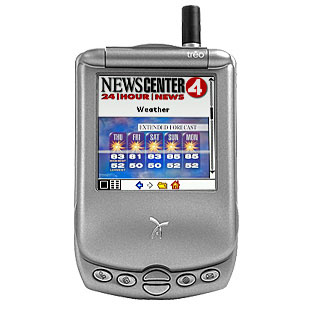 |
As for PDA-based operating systems Palm OS and Pocket PC 2002 Phone Edition, they are even more rare than the Motorola Accompli. Mass production of the first (Treo from Handspring) has only just begun, and this is probably the only reason for their unpopularity. And the second is so expensive that involuntarily think about it - for whom are they produced? Yes, though he brilliant, but to buy a computerized phone for a thousand or twelve hundred dollars will be resolved, not every phone ... well, not a helicopter. Fortunately, computer technology has a pleasant feature of the fall in price. It is unlikely to happen with Pocket PC 2002 PE (statistics of the last two or three years proves the opposite - the new model if you do not rise in price, then do not become less accurate), but with the Nokia 9210 has happened. And it is remarkable, since a great machine for everyday use and really helpful ... All produced today and preparing for release tomorrow, communicators can be divided into two unequal to the number of patterns and functional groups - keyboard and keyboardless device. By the keyboard is the best-selling Nokia 9210, exotic for us, Motorola Accompli 009 and referred Motorola V100. Moreover, Motorola V100 from this a short-list is better to exclude - not to knock yourself confused. This is not a communicator. This typing SMS-pager and cell phone (which can only be used with an external headset), equipped with a simple means to organize personal time (clock and calendar). With the full keyboard communicators Motorola (for example, Accompli 009) it unites body design (shell or micro-laptop) and nothing more.
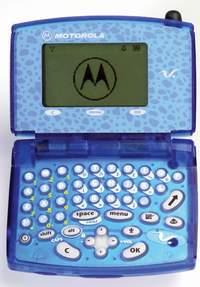 |
However, someone may need just such a partner - a more accessible and at the same time easy to use tool for sending and receiving SMS-messages her short is not easy to find.At a cost of about $ 120 V100 seems to be quite rational purchase, the more so because he, like all officially delivered to Russia devices from Motorola, excellent Russified (will not be problems with sending and receiving SMS-ok in the Cyrillic alphabet). At the same time the owner a chance to look at the mobile communicators, as a new class of portable digital devices. For a wireless connection to the Internet V100, in general, fit no matter, although you can rasprobovat and this - through the integrated browser WAP (where it just does not) ... In short, their money is V100, but the communicator is a very, very conditional ... But Nokia 9210 more than a communicator. This is - this handheld computer to program stuffing close to the family of computers Psion. This and all of its advantages - resiliency, well-rounded basic software, logical and easy operation, excellent multimedia capabilities (screen, the color).
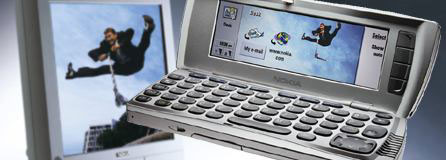 |
But there is no barrel of honey without the fly in the ointment. Cell function device - sending and receiving messages via e-mail, surfing the Internet sites - will fly to the owner in the 9210 penny, because this machine does not support packet data GPRS. Without this service, any device loses its meaning. Unless, of course, the owner of the unit is not a burden hung for an hour or so on the Internet at a price per minute charge voice calls (very quickly nabezhit couple of hundred dollars) ... If not consider a specific model, and communicators in general, we can draw the following conclusions. Mobile communicator - a dynamically changing, yet in many ways not shaped the form of portable equipment. Universal models suitable for solving a broad enough range of problems does not exist yet. Even a very attractive new items have many drawbacks - such as lack of support for GPRS, not a "pocket" size, high power consumption.
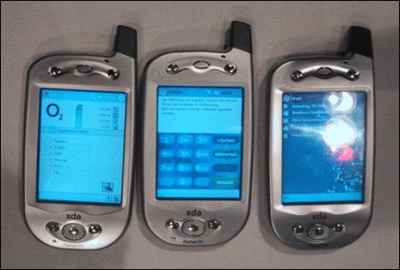 |
In the convenience of modern communicators lose and phones, and PDAs (incidentally, this is a feature of any combination of devices). Their phone use interferes with a large touch screen, inadvertent contact which could lead to the launch of a completely unnecessary at this time programs. Lack of hardware keyboard models with touch input makes quick dialing. User is forced to take out a pen, call the on-screen keyboard, press the virtual buttons, that is, make a lot of unnecessary actions to achieve the elementary result - to call. In comparison with the Pocket PC loss is less. To its credit, the developers communicators do not have problems of compatibility with software for related platforms. It is understandable - Operating System Pocket PC PDA family differs from the base operating system only in the presence driver support GSM module and a number of supporting applications (because of what OS and has the prefix Phone Edition - phone edition). Communicator is based on Palm OS differences from the base system is also unavailable. What then is the smartphone gives a PDA? If you do not pay attention to detail, the dependence on the power supply. At discharge batteries (or requirement to remove the phone, for example, in the cabin), the owner of the communicator loses all at once - and the phone and computer. This is perhaps the most notable shortcoming. And the advantage is obvious - the communicator eliminates the need to carry two separate devices ... So is it really worth the communicator today? If you turn up interesting model - completely. In the end, it's just a small digital assistant. Bored, you can push it further in a drawer. Or sell.I also like more than "pure" PDA and GSM card in slot a Pocket PC. We get the same thing, but without sverhpereplaty. Is not it?
Smart phones
Smartphones - that's what is really developing at a frantic pace. Progress is so palpable, that if today expanded on the counter two dozen new models, distinguished by eye just from smart phones will be very difficult.
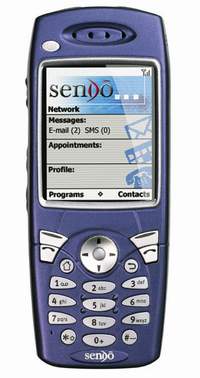 |
| Sendo Z100 Smartphone |
By the way, what's the fundamental differences? Several of them. The first - the smartphone must have everything necessary for wireless data exchange. Namely - the built-in modem, cable or wireless (infrared, Bluetooth) connection to a PC. The second - a smartphone equipped with the basic functions of a handheld computer, that is, programs of personal time, address book and so on. And the third - the smartphone is equipped with software for accessing Internet resources - a WAP browser and email client that supports most common protocols. Note that the second and third features are not unique to smartphones, but also ordinary cell phones. Browser WAP, e-mail clients, organizers, calendars, games - all this is in most phones, starting with the cheapest. This means ... that the vast majority of modern cell phones can be considered smartphones? Only partly, though called smartphones phones, "packed" with additional capabilities "to the very top of the head." And, I repeat, have built-in modem (without access to global network resources is possible only by using special tricks - for example, through a service SMS, as in Ericsson A2826s). The disadvantages of smartphones in terms of their communication capabilities can be considered a small screen, small memory footprint and unique software, which in most cases it is impossible to update. Small screen - a very serious limitation. It completely eliminates the conventional view web-pages and use your smartphone as a PDA. How, for example, on a tiny screen to edit text or read e-books? Unthinkable thing ... And yet, in everyday life the practical benefits of a smartphone than on the device. Think about it - but why do we need "Internet on the knee? Why this extravagance? Retrieve e-mail, read it and make a short (not long messages SMS) is able to answer your smartphone. Serve as an intermediary between a portable or handheld computer and the provider - too. The main functions of an electronic organizer smartphone sells reasonably well (make a reservation - whichever). Plus optional fun, like two or three simple ones toys, MP3 player and even a built-in digital camera. It would seem - what's missing? (Answer - perfect). But the undoubted merit of any smartphone, however bizarre it was, that it is a regular cell phone, with buttons, display and traditional management. Hence, a purely phone functions it performs flawlessly. To the detriment of the computer, of course ...
Computer plus phone
And a year and two and even three years ago, thinking about the computer reporters' office in your pocket "ended indispensable recommendation not particularly smart and opt for a computer class Palm (at least Pocket PC) and a cell phone with an infrared port and built-in modem. Since then, little has changed. Well, unless there were smartphones, which in some cases can do without the CCP. A comfortable, full-featured, affordable communicator as there was, and is not ... And this is after a powerful advertisement for new devices in the network and paper media? Yes - and after the advertising ... The fact that computer journalism is very biased when it comes to portable devices, wireless access to network resources. Not in the sense one-sided that trashes the winds, and vice versa - is trying to consider the advantages and possible applications.Appliances something unusually interesting! A journalist - a man and curious light on his feet ... But even this positive attitude does not give rise to speak in favor of communicators is unique. There is always polemical, "but", which often brings delight to the meaningless zero. Take a look at the same Nokia 9210. To own such a gizmo - a pleasure. But in 9210 as a phone is great, as the device is too slow and expensive (cost of failure to support GPRS), as a handheld computer is deprived of the extensive software support, which are Palm and Pocket PC ... And this is the best of the best! What can we say about the new models, a market whose fate is in question?
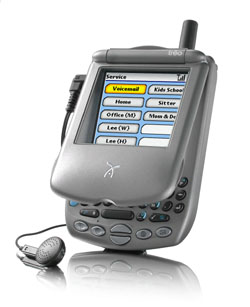 |
On the other hand, handheld computers and smart phones have reached a stage of development, which manifest a new quality. PDA Palm family written so much software that is quite impossible to say what is still lacking. A smart phones get unexpected features (such as editing software for ringtones or multicolored backlight) and rapidly move from the category of the prestigious vehicles in the group of low cost phones. Today, over one hundred dollars you can buy the unit for which two years ago would have had to pay every six more. What is not an indicator? .. Leaving aside the theoretical arguments and revert to the practice, you can repeat the recommendation of its predecessors. To work with textual and numerical information in a way to get your e-mail and view web-pages is better to use a keyboard PDA type Psion 5mx or Jornada 720 and a cell phone with built-in modem, infrared port and support for protocols GPRS. This kit is similar to the concept of "office in your pocket," even though the functionality is clearly not up to the level of a subnotebook. For efficient check the contents of a mailbox, receiving emails and sending immediate responses to a brief surfing on WAP-resources fits one of the new smartphones - with support for GPRS, and perhaps with some multimedia items (at least will have something fun on the way). If you do not bring to the wireless excessive demands, the acquisition of the smartphone will be the most rational option.
 |
| Palm m515 in conjunction with a Bluetooth-GPRS-mobile phone Ericsson T68: receiving e-mail |
For e-mail and in cases where quick access to various kinds of background information important than text editing, or more or less complex calculations, for correspondence on ICQ, infrequent visits to the WAP-page (and usually, if a question of computers on based operating system, Windows CE) and to obtain from News Network is the best choice handheld Palm or Pocket PC into a pair with a cell phone with an infrared port, built-in modem and support for GPRS. In this latter group of applications can take advantage of the already mentioned option - set in the PDA (if your computer allows it) card GSM. True, the card with support for GPRS I have not come across.
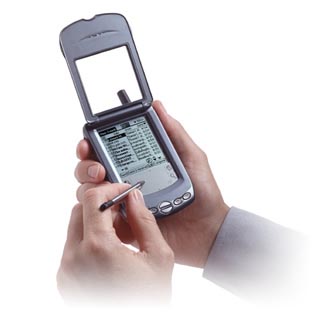 |
| Treo 180 |
Well, if you want to have the newest, most expensive, most prestigious mobile device, you can (and should) choose one of the communicators, released this year. Yes, if Handspring Treo 180. That's all obzaviduyutsya ...For dessert, try to reduce the three above Hlávka to three sentences. There are two pieces of news, good and bad. Good - wireless industry communicators and smartofnov does not stand still. The bad - but they still want money for them. The authors, translation:







